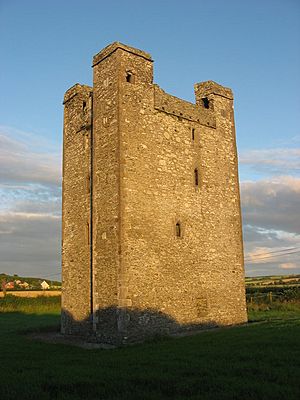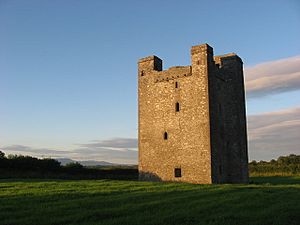Roodstown Castle facts for kids
Quick facts for kids Roodstown Castle |
|
|---|---|
| Native name Irish: Caisleán Bhaile an Rútaigh |
|
 |
|
| Type | tower house |
| Location | Roodstown, Ardee, County Louth, Ireland |
| Area | Dee Valley |
| Height | 15 m (49 ft) |
| Built | 15th century |
| Owner | State |
| Official name: Roodstown Castle | |
| Reference no. | 298 |
| Lua error in Module:Location_map at line 420: attempt to index field 'wikibase' (a nil value). | |
Roodstown Castle is an old castle from the 1400s in County Louth, Ireland. It's a special type of castle called a 'tower house' and is protected as a National Monument. This means it's an important historical site that the country looks after.
Where to Find Roodstown Castle
You can find Roodstown Castle right next to the road. It's about 3.6 kilometers (2.2 miles) north-east of a town called Ardee.
The Story of Roodstown Castle
Roodstown Castle was built in the 15th century, which means sometime in the 1400s. It was built in a very important spot. This spot was between two rivers, the River Glyde and the River Dee, and also near the town of Ardee and the Irish Sea. This made it a good place to watch over the land.
The castle is similar to other castles built around that time, especially those made during the rule of King Henry VI. It's even taller than some of them! People in the area often connect this castle with a powerful family called the Taaffe family.
What the Castle Looks Like
Roodstown Castle is a rectangular building with four floors. It has small towers, called turrets, on two of its corners. One of these turrets holds a spiral staircase that goes up through the castle. The other turret has special rooms called garderobes, which were like old-fashioned toilets.
The ground floor of the castle has a vaulted ceiling. This area was likely used as a cellar or for storage. The castle also had a 'murder-hole'. This was a hole in the ceiling above the entrance. Defenders could drop things through it onto attackers below.
At the top of the castle, there's a crenellated parapet. This is the wall with gaps (like teeth) that you often see on castles. It was used for protection. There was also a 'chemin de ronde', which was a walkway behind the parapet for guards.
The upper floors of the castle have large windows shaped in a special way called 'ogee'. These floors also have fireplaces, which would have kept the castle warm in the past.
 | James Van Der Zee |
 | Alma Thomas |
 | Ellis Wilson |
 | Margaret Taylor-Burroughs |


